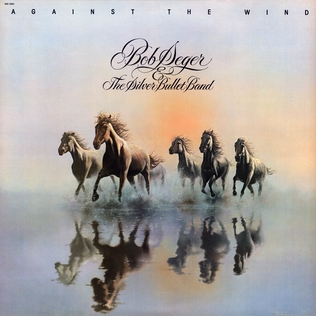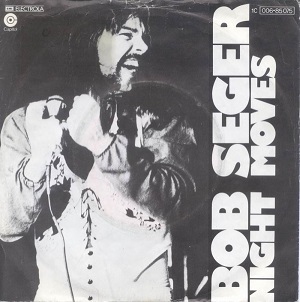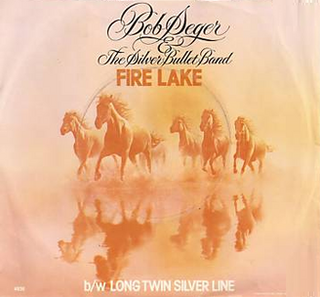Related Research Articles

Robert Clark Seger is a retired American singer, songwriter, and musician. As a locally successful Detroit-area artist, he performed and recorded as Bob Seger and the Last Heard and the Bob Seger System throughout the 1960s, breaking through with his first album, Ramblin' Gamblin' Man in 1969. By the early 1970s, he had dropped the 'System' from his recordings and continued to strive for broader success with various other bands. In 1973, he put together the Silver Bullet Band, with a group of Detroit-area musicians, with whom he became most successful on the national level with the album Live Bullet (1976), recorded live with the Silver Bullet Band in 1975 at Cobo Hall in Detroit, Michigan. In 1976, he achieved a national breakout with the studio album Night Moves. On his studio albums, he also worked extensively with the Alabama-based Muscle Shoals Rhythm Section, which appeared on several of Seger's best-selling singles and albums.

Ramblin' Gamblin' Man is the first studio album by American rock band the Bob Seger System, released in 1969. The original title was Tales of Lucy Blue, hence the cover art. In the liner notes, Bob Seger says (sarcastically) he later realized Lucy Blue was "Ramblin' Gamblin' Man", and so changed the title of the album. He then thanks "Doctor Fine" for this realization. The original cover design for the album featured the nude figure from Botticelli's The Birth of Venus, but this too was changed for the final release.

Mongrel is the third studio album by American rock band the Bob Seger System, released in 1970. During its four-week run on the Billboard 200 chart, the album entered the chart at the end of October 1970, then rose to number 171 two weeks later.

Brand New Morning is the fourth album by American singer-songwriter Bob Seger and his first solo studio album following the departure of backing band The Bob Seger System. It was produced by Punch Andrews and released in October 1971. The album has a stripped-down acoustic sound.

Smokin' O.P.'s is the fifth studio album by American rock singer-songwriter Bob Seger, released in 1972. It marked Seger's return to rock and roll, after the sonic departure of his previous album, Brand New Morning. The album was reissued on CD by Capitol Records in 2005. It is currently the earliest Bob Seger album available on CD. The cover art is a parody of the Lucky Strike cigarette logo. Smokin' O.P.'s refers to Smokin' Other People's Songs, a derivation on the slang phrase "Smoking O.P.'s" meaning to smoke other people's cigarettes exclusively. Most of the tracks on this release are covers of songs written by other artists.

Back in '72 is the sixth studio album by American rock singer-songwriter Bob Seger, released in 1973. It was the first new album on Seger's manager Punch Andrews' label, Palladium Records, to be released under their distribution deal with the Reprise division of Warner Bros. Records and one of three early Seger albums that has never been reissued on CD.

Seven is the seventh studio album by American rock singer-songwriter Bob Seger, released in 1974.

Beautiful Loser is the eighth studio album by American rock artist Bob Seger, released in 1975. This album marked Seger's return to Capitol Records after a four-year split. His previous record with Capitol was Brand New Morning in 1971.

Stranger in Town is the tenth studio album by American rock singer Bob Seger and his second with the Silver Bullet Band, released by Capitol Records in May 1978. As with its predecessor, the Silver Bullet Band backed Seger on about half of the songs and the Muscle Shoals Rhythm Section backed Seger on the other half.

Against the Wind is the eleventh studio album by American rock singer Bob Seger and his third which credits the Silver Bullet Band. Like many of his albums, about half of the tracks feature the Muscle Shoals Rhythm Section as backing musicians. It was released in February 1980. It is Seger's only number-one album to date, spending six weeks at the top of the Billboard Top LPs chart, knocking Pink Floyd's The Wall from the top spot. Seger said that the album "is about trying to move ahead, keeping your sanity and integrity at the same time."

Like a Rock is the thirteenth studio album by American singer-songwriter Bob Seger, released in 1986. The title track is best known for being featured in Chevrolet truck commercials throughout the 1990s and early 2000s.

The Fire Inside is the fourteenth studio album by American singer-songwriter Bob Seger. The album was released in mid 1991 on the record label, Capitol. It was Seger's first album of entirely new music since Like a Rock in 1986. Though credited to "The Silver Bullet Band", much of the album used guest and session musicians, with limited contributions from Silver Bullet Band members. Among the guest artists on the album are Joe Walsh, Bruce Hornsby, Roy Bittan, Steve Lukather, Don Was, Waddy Wachtel, Rick Vito, Mike Campbell, Patty Smyth, Lisa Germano, and Kenny Aronoff.

"Night Moves" is a song by American singer-songwriter Bob Seger. It was the lead single from his ninth studio album of the same name (1976), which was released on Capitol Records. Seger wrote the song as a coming of age tale about adolescent love and adult memory of it. It was based on Seger's teenage love affair, which he experienced in the early 1960s. It took him six months to write and was recorded quickly at Nimbus Nine Studios in Toronto, Ontario, with producer Jack Richardson. As much of Seger's Silver Bullet Band had returned home by this point, the song was recorded with several local session musicians.

Joseph Francis "Sonny" Burke was an American musical arranger, composer, Big Band leader and producer.

Greatest Hits is a compilation album by Bob Seger & the Silver Bullet Band, released in 1994. Certified Diamond by the RIAA, it is Seger's most successful album to date. In December 2009, Billboard and Nielsen SoundScan confirmed that with nearly nine million copies sold. Bob Seger's Greatest Hits was the decade's best-selling catalog album in the United States, even out-selling The Beatles' 1 and Michael Jackson's Number Ones. By September 2011, the album had sold a total of 9,062,000 copies in the United States.
"Lucifer" is a song written by Bob Seger featured on the album Mongrel. It reached #84 on the Pop Singles chart in 1970. Many Seger fans consider this to be one of Seger's best. Ben Edmonds, in his review of Mongrel, called "Lucifer" "easily the strongest cut on the record, and a great song in its own right. It's simple, straightforward rock: the band shows a clear comprehension of the song's rhythmical movement." The Bob Seger System performed this song on the TV show Upbeat, which was a syndication of musical performances taped at the WEWS studios in Cleveland, Ohio, with host Don Webster. In 2009, a clip of the song was used in the sixth-season finale of Entourage, episode "Give a Little Bit." In 2021, "Lucifer" was covered by Deep Purple, on their album, Turning to Crime.

"Fire Lake" is a song written and recorded by the American musical artist Bob Seger. He had planned to record "Fire Lake" for his 1975 album Beautiful Loser, but the track was not finished. The song had been partly written years before, in 1971, and was finally finished in 1979 and released in 1980 on Seger's album Against the Wind. The single reached number 6 on the Billboard Hot 100. A live version of the song appeared on the album Nine Tonight, released in 1981.
"East Side Story" is an early Bob Seger single. It was Seger's first single with his group The Last Heard, marking his departure from Doug Brown and the Omens and the beginning of his own career. The song reached #3 on the Detroit charts.

Early Seger Vol. 1 is a compilation album by American rock singer–songwriter Bob Seger, released in 2009. The album, which includes archival material from the 1970s and 1980s, was released exclusively to Meijer stores on November 24, 2009. Since November 30, 2009, it has also been available for purchase at BobSeger.com, both on CD and as a digital download. Eventually Early Seger Vol. 1 became available at Amazon.com on February 1, 2010. "Gets Ya Pumpin" and "Midnight Rider" are the first two singles from the album.

The Underdogs were an American garage rock band from Grosse Pointe, Michigan who were active in the 1960s. They became a regular attraction at the Hideout, a club that was an early venue for acts such as Bob Seger, Glenn Frey, and The Pleasure Seekers, featuring Suzi Quatro, and it also served as the home to the Hideout record label, which released several of the Underdogs' singles. The group enjoyed success in the region and came close to breaking nationally with two records released though a joint deal on Reprise Records and then their last on Motown. The Underdogs' work has been included on various garage rock compilations such as the 1998 Nuggets 4-CD box set released on Rhino Records.
References
- ↑ Whitall, Susan (2006-12-13). "You'll find longtime manager Punch Andrews at the vortex of Seger's career". Detroit News. Retrieved 2008-04-28.
- ↑ Graff, Gary (2007-10-17). "Kid Rock Splits With Longtime Manager". Billboard. Retrieved 2015-02-05.